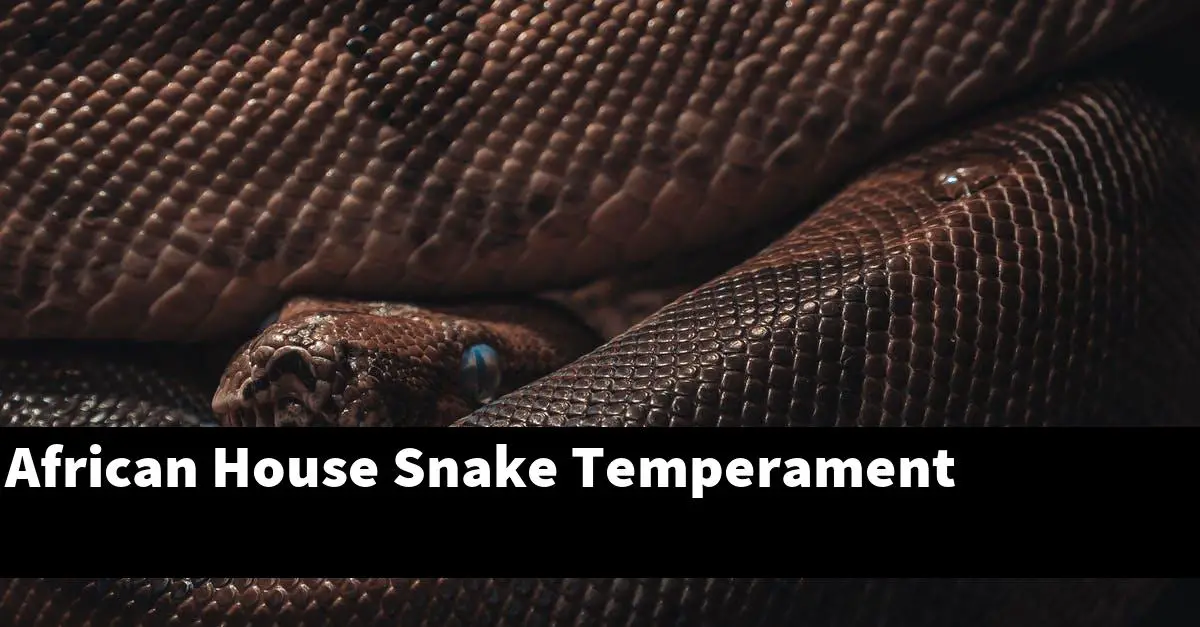The African house snake is a docile and placid species. They are known to be very calm and rarely bite. Although they are not aggressive, they will defend themselves if they feel threatened.
The African house snake is a non-venomous constrictor snake. They are docile snakes that make great pets. They are also one of the most popular snakes in the pet trade.
Table of Contents
What are some common temperament traits of African house snakes?
African house snakes are a type of snake that is found in Africa. They are small to medium-sized snakes that can grow to be about 2 to 3 feet long. They are non-venomous snake that is not considered to be dangerous to humans. African house snakes are popular pet snakes due to their docile nature and their ability to be easily handled.
African house snakes are typically a brown or tan color with darker brown or black bands running across their body. They have round heads and their eyes are located on the sides of their head. African house snakes are diurnal snakes, which means that they are active during the day. They are typically active during the early morning and late afternoon hours.
African house snakes typically live in Africa, specifically in the sub-Saharan region. They can be found in a variety of habitats, such as forests, grasslands, and savannas. African house snakes typically feed on small mammals, such as rodents and lizards.
The average lifespan of an African house snake is 10 to 12 years, although some snakes have been known to live up to 20 years. African house snakes are not considered to be endangered at this time.
How can you tell if an African house snake is happy and healthy?
A happy and healthy African house snake will typically have a bright and vibrant coloring, with no visible signs of injury or illness. They will be active and alert, and their eyes will be clear and bright.
Their movements should be smooth and graceful, and they should be able to easily coil and uncoil their bodies. If you are unsure whether or not your African house snake is happy and healthy, it is always best to consult with a reptile veterinarian.
What should you do if your African house snake seems to be stressed or agitated?
If your African house snake seems to be stressed or agitated, there are a few things you can do to help. First, check to see if the snake is in a comfortable environment. The cage should be the proper size for the snake, with plenty of hiding places.
The temperature and humidity should be appropriate, and there should be no drafts. If everything looks good in the cage, try handling the snake more gently and slowly. If the snake is still stressed, you may need to consult a reptile veterinarian.
What are some common causes of African house snakes becoming aggressive?
There are several reasons why an African house snake might become aggressive. One common reason is if the snake feels threatened. If the snake feels like it is in danger, it may become aggressive in order to protect itself.
Another common reason for the aggression is if the snake is not feeling well. If the snake is sick or injured, it may become aggressive out of pain or fear. Finally, some snakes simply have a more aggressive personality than others. If a snake is naturally aggressive, it may be more likely to become aggressive even when it is not threatened or ill.
How big do African house snakes get?
African house snakes typically grow to be between 3 and 5 feet in length. However, some individuals have been known to reach lengths of up to 6 or 7 feet. These snakes are relatively slender, and their bodies are covered in smooth scales. The coloration of African house snakes can vary quite a bit, but they are typically some shade of brown, with darker brown or black markings.
How big of a tank does an African house snake need?
A standard adult African house snake will need a minimum 20-gallon enclosure. A 20-gallon long aquarium is the best size for a single adult African house snake. If you plan on keeping more than one adult African house snake together, you will need to increase the size of the enclosure accordingly.
It is best to err on the side of caution and go with a larger enclosure, as African house snakes are very active and need plenty of space to move around.
Can African house snakes be housed together?
Yes, African house snakes can be housed together, but it is important to do so carefully. These snakes are not naturally social creatures, so care must be taken to introduce them slowly and carefully.
It is also important to make sure that the snakes are of similar size, as larger snakes can be aggressive towards smaller ones.
Are African house snakes good pets?
Yes, African house snakes can be good pets. They are generally gentle snakes that enjoy being around people, and they make great additions to any reptile enthusiast’s collection. African house snakes are also relatively easy to care for, as they do not require a large enclosure or special lighting.
Summary
African house snakes are generally non-aggressive, but they may bite if threatened. They are not venomous, so their bites are not dangerous.
They are small to medium-sized snakes that can grow to be about 2 to 3 feet long. They are non-venomous snake that is not considered to be dangerous to humans. African house snakes are popular pet snakes due to their docile nature and their ability to be easily handled.

